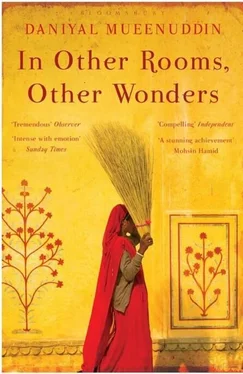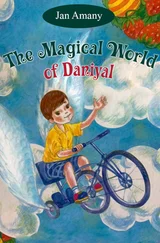‘What are you laughing at?’
‘Nothing. You look like my uncle, except he was huge and fat and you’re thin. He always blew on his tea and then he sipped it and looked sort of gloomy and important, like you do.’
‘Gloomy?’ He said it in the funniest way, startled.
I can get him, she thought, and it sent a shiver of happiness through her.
‘I’m just joking with you. You’re completely different from my uncle. Is that better?’
He smiled, not as a grown-up does, but like a child, smiling with his eyes and mouth and the wrinkles bitten into his face, cheerfully. She noticed this, and thought, He smiles all over, the same way I do .
‘You’re making fun of me. Well go ahead, I’m an old man. It’s time for me to be a fool.’
She thought of disagreeing with him, saying he would never be a fool — but stopped herself. Instead she said, ‘Well, whatever time it is, I don’t think foolishness wears a watch.’
‘You’re full of riddles, little girl.’
‘Little girl.’ Finishing her tea, she took both her cup and his into the kitchen and washed them carefully. Going out again and walking past him, she said, ‘Thank you, I feel better for talking to you, Uncle.’
In her room, she sat on the bed cross-legged, closed her eyes, leaned back against the wall, and thought, After all, why not? Why shouldn’t I ?
Saleema avoided Rafik during the next few days, watching him, but not presuming on the intimacy of their one conversation. She had never been discreet, so that although she did this almost unconsciously, it suggested to her new possibilities of relation, defined not by constraint — which she understood — but by delicacy. Then fate stepped in to reward her. Every year, at the time of the wheat harvest, K. K. Harouni went for a week to his farm at Dunyapur, on the banks of the Indus. His daughter Begum Kamila that year accompanied him, and therefore Saleema went too.
Early on the morning of the departure the two cars stood in front of the house, one under the portico, for the Sahib and Kamila, and the other for the servants. The drivers polished the cars while they waited, leaning over to clean the windshields, experts. Saleema had tied her clothes in a bag. She had bought a new pair of sandals the day before, and now the red plastic straps were cutting into her feet. When the master came out, leaning on Rafik’s arm, those who were sitting on their haunches stood up sharply. He got into the car, called Shah Sahib the accounts manager over, spoke to him briefly through the lowered window, and then the car pulled away, passed under the alley of ancient flame-of-the-forest trees, and turned out the gate. Everyone relaxed, Shah Sahib lit a cigarette, looked without interest over the scene, and returned to his office.
‘Come on, come on, get it done,’ Samundar Khan driver said to the gardeners, who were loading provisions into the trunk of the second car.
Hassan sat in the front, wearing a lambskin cap that brushed the roof, Rafik and Saleema in the back, a basket of food on the seat between them. She had never before ridden in a private car. Sitting with her hands on her knees, she looked out the window at the old shops along the Mall, Tollington Market, where Hassan went on his bicycle to buy chickens and meat, then the mausoleum of Datta Sahib.
I suppose people looking in must wonder who I am, she thought.
As they came across the Ravi River bridge she asked if she could open her window, not so much because she wanted to, as to register her presence. Hassan and Samundar Khan were arguing about whether the fish in the river had been getting bigger or smaller in the last few years.
‘O for God’s sake,’ said Hassan, ‘what do you know about it. I’m a cook, and I’ve been cooking fish longer than you’ve been breathing. Listen to me, once upon a time the fish used to be half as big as this car.’
‘For you old guys everything used to be bigger.’
With Hassan, this could go on for hours. Saleema asked again, ‘Can I open the window please?’
They were stuck in traffic going through the toll.
‘Go ahead,’ Samundar Khan said. ‘The air’s free.’
She couldn’t find the handle. Rafik leaned over and touched the button, and the window glided down. He pointed out at the river. The rising sun threw a broad stripe of orange on the chocolate brown water. Bicycles and donkey carts and gaudy Bedford trucks streamed in and out of the city over the bridge. He gestured with his eyes at Samundar Khan and Hassan debating nonsense in the front.
‘Wisdom against youth,’ he whispered.
Saleema drove back into her childhood, through towns the same as those around her home a hundred miles to the east, rows of ugly concrete buildings, crowded bazaars, slums, ponds of sewage water choked with edible water lilies, then open country, groves of blossoming orange trees, the ripe mustard yellow with flowers; but she rode in an immaculate car instead of a bus crashing along thick with the odor of the crowd. She had painted her nails the night before; her hand rested on the sill of the window, the spring air brushing her fingers. She felt pretty. They drove through mango orchards, fields of harvest wheat. Rafik sat telling a rosary of worn plastic beads, mouthing the ninety-nine names of Allah, his eyes dull, allowing the landscape to pass through him.
They turned onto a single-lane road, which led first through barren salt flats, then irrigated fields, and finally into an orchard of old mango trees.
‘All this belongs to Mian Sahib,’ said Rafik.
They drove up a packed dirt road bordered with jasmine, along the brick wall that enclosed the house, running for several acres, and then into a cul-de-sac planted with rosewood trees. Ten or twelve men sat on benches and stools — the managers and others who wanted to be noticed by the landowner. Rafik stepped out of the car and embraced them one by one. Several of them looked over at Saleema and said, ‘ Salaam, Bibi jee.’
After they had tea Rafik said to her, ‘Come on, I’ll show you where Begum Kamila’s room is.’
They went through an ornate wooden door, set in the wall, and into a lush garden that stretched away and became lost among banyans and rosewood trees and open lawns.
She paused, shading her eyes with her hand, taking in the green sward.
‘There’s more than you can see. If you like, I’ll show you later.’
Walking through a grassy courtyard, Rafik came to a door, removed his shoes, and knocked.
‘Come in,’ called Begum Kamila. She was sitting in an armchair reading a book. ‘So you’ve come, have you?’
She must once have been a very beautiful woman. She wore bright saris and colored her long hair jet black, and on her third finger she wore an immense emerald set in gold, which Saleema once found lying next to the bathtub, and held in her palm for a long time, feeling the heft of the stone, guessing what it must be worth.
‘Shall I light the fire, Begum Sahiba?’ asked Rafik.
‘Go ahead, it’ll take away the damp. I suppose Daddy’s about to call for lunch.’
Rafik kneeled in front of the fire, twisting sheets of newspaper into sticks.
Kamila’s bags had been placed on a long desk by the window, which overlooked another garden. Lines had been chalked in the grass for tennis and a net strung. Saleema took the toiletries into the bathroom and laid them out. Unlike the house in Lahore, where the doors were smudged with fingerprints and the paint flaked off the walls in strips, these rooms had been newly painted. The rugs were bright and clean, the brick floors had been washed, vases of flowers, badly arranged, had been placed all around, mari golds and roses.
Going out again into the dark chilly bedroom, Saleema found Rafik still kneeling at the hearth, the flames orange on his orange face.
Читать дальше












